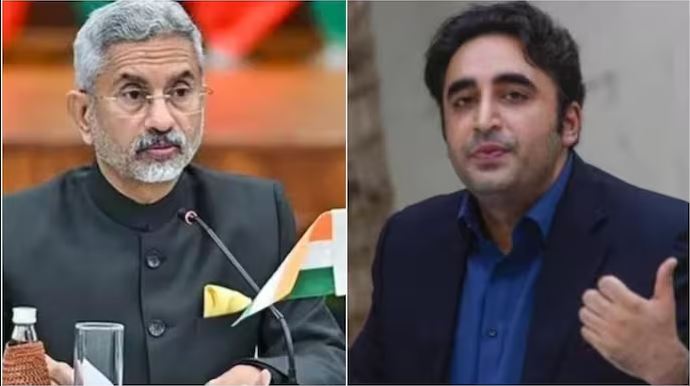Jaishankar will meet with Chinese and Russian colleagues for bilateral discussions, but a meeting with Pakistani FM is improbable
New Delhi – On Thursday, Russian Foreign Minister Sergey Lavrov, Chinese Foreign Minister Qin Gang, and SCO Secretary-General Zhang Ming will meet with S Jaishankar, the minister of external affairs, in three critical bilateral sessions.
On the eve of the SCO’s (Shanghai Cooperation Organisation) foreign ministers meeting in Goa, the meeting will be held.
The purported Kremlin attack on Wednesday would put the Russia-Ukraine conflict front and centre in Goa and may take centre stage in discussions between the Russian and Indian ministers.
First Meeting
Prior to lunch, the two leaders will have their first bilateral meeting with SCO Secretary-General Zhang Ming, with a focus on advancing the ideals of the “Shanghai Spirit,” enhancing political trust between them, advancing cooperation in a number of areas, firmly upholding international justice, facilitating the organization’s growth, modernising its internal structure, and ensuring the efficiency of various mechanisms.
Prior Encounter With China
Zhang Ming discussed the SCO Secretariat’s top priorities during a meeting with the Chinese foreign minister on April 19. These included support for the presiding state’s organisation of the major annual SCO events, efforts to facilitate the implementation of the consensus reached by member state leaders, and active participation in enhancing the SCO mechanism and growing the Organisation.
This may represent the general format of their meeting with Jaishankar.
Another critical meeting between Jaishankar and the Chinese foreign minister Qin Gang will also take place. In order to clear the way for President Xi Jinping’s attendance to the SCO and G20 summits slated for July and September of this year, the two sides will discuss the ongoing border tensions and strategies to alleviate tensions.
After the Galwan incident and China’s continued presence in Eastern Ladakh since May 2020, the Indian side has made it abundantly clear that “business as usual” is not an option.
According to Jaishankar, the relationship between China and India is in a “abnormal” state, and there are significant issues that call for an honest and open discussion.
G20 visit to Qin Gang
Earlier in March, Qin Gang was to India to attend the G20 conference of foreign ministers. While there, he met with Jaishankar and discussed the Chinese military actions in eastern Ladakh in May 2020 that resulted in a four-year impasse.
We are meeting for the first time since he became foreign minister. After meeting with Qin on March 2, Jaishankar said, “We spoke for maybe 45 minutes, and the majority of our discourse was about the current status of our relationship, which many of you have heard me describe as anomalous.
I used a number of adjectives in the meeting, including those. There are legitimate issues in that relationship that need to be examined and that need to be talked between us in a very honest and sincere manner, he continued.
The 18th round of Corps Commanders level negotiations to end the deadlock in eastern Ladakh was then held between the two parties.
Visit by Li Shangfu
Following Qin’s trip to India, Li Shangfu, China’s defence minister, travelled to New Delhi to attend the SCO ministers meeting on April 27. While there, he spoke with Rajnath Singh, his Indian counterpart.
Singh told Li Shangfu during their meeting that China’s breach of the border agreements had “eroded” the foundation of their relationship and that all border-related disputes needed to be settled in accordance with the existing arrangements.
Gen Li, however, argued that the situation at the China-India border is “generally stable” and that both sides should place the frontier issue in a “appropriate position” and support the process of moving it towards “normalised management.”
In order to fully prepare for this year’s SCO summit, Qin will discuss with other counterparts at the SCO Foreign Ministers meeting the international and regional situation as well as cooperation among the member nations in various domains.
Since becoming the foreign minister, Qin has made two trips to India.
India and Russia meet
When Sergey Lavrov and External Affairs Minister Jaishankar meet at 3 p.m., they will examine the deteriorating situation between Russia and Ukraine as a result of the two UAVs that were destroyed over the Kremlin. Vladimir Putin was the target of what Moscow has referred to as a “assassination attempt” in this incident.
The enormous and widening trade gap between the two nations, which places India at a disadvantage, will also be a major topic of discussion between the two parties.
In recent months, India’s trade deficit with Russia increased noticeably as a result of the country’s massive purchases of cheap crude oil during the Ukraine crisis.
According to sources, a range of topics pertaining to bilateral relations and regional circumstances, notably the situation in Afghanistan, would be discussed at the talks between Jaishankar and Lavrov.
India and Pakistan have not met.
There won’t likely be any talks or meetings between the foreign ministers of Pakistan and India.
Bilawal Bhutto Zardari, the foreign minister of Pakistan, will head the team to Goa for the SCO meeting. Since Hina Rabbani Khar’s trip there in 2011, Zardari will be the first Pakistani foreign minister to visit India.
Downgrading the visit was not an option for Pakistan because cooperation with Russia and China at this time of economic crisis is crucial.
A bilateral meeting, however, has been absolutely ruled out in light of Jaishankar’s most recent remarks made during his trip to the Dominican Republic, where he spoke extensively about multipolarity.
He claimed that, with the exception of China and Pakistan, each engagement has its own distinct weight and focus. The minister stated that India’s immediate neighbours remain its first priority. Given India’s size and economic power, it is primarily for the benefit of all parties involved that India approaches cooperation with its smaller neighbours in a generous and non-reciprocal manner.
And under Prime Minister Modi, we have done precisely that over the past ten years. In our area, this is called as the Neighbourhood First strategy, Jaishankar remarked.
India has witnessed a remarkable increase in regional connectivity, relationships, and cooperation. Pakistan is obviously the exception to this rule because of the cross-border terrorism it sponsors. But India has always stood up for its neighbours, whether it be during the Covid challenge or more recent debt pressures, according to Jaishankar.
Bhutto on PM Modi
Months have passed since Bilawal referred to Prime Minister Narendra as the “butcher of Gujarat” in New York.
At a press conference about Islamophobia, Zardari stated that the UN “remains unaddressed” with regard to the Jammu and Kashmir issue and that “extra focus” was required.
In defending his comments about Indian Prime Minister Narendra Modi, Bilawal Bhutto Zardari claimed that he was merely discussing historical reality.
I was referring to historical reality,” Bilawal said in a Bloomberg interview. It was not my words that I used. I didn’t dial ae.The nickname “Butcher of Gujarat” for Mr. Modi was not coined by me. Following the riots in Gujarat, Mr. Modi was referred to by that name by the Muslims in India. They think that repeating history is a personal insult, and I believe I was making reference to a historical fact.
Bhutto will raise the Kashmir conflict
But the Pakistani foreign minister is anticipated to raise the Kashmir issue at a press conference and in interviews with Indian media outlets in Goa.
India’s stance on Kashmir is still that the conflict must be settled bilaterally between India and Pakistan. India has insisted that the internal problems in Jammu and Kashmir are an internal affair and do not call for Pakistani intervention.


